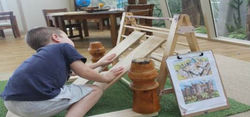
Importance of Play
Play is natural for young ones.
Children from all around the world and from all cultures engage in play, and although the types of play and purposes for play can be different across ages and cultures, the inborn desire to play is the same for all children, and ultimately their way of learning and making sense of the world.
There is no one on this earth better, in our opinion, to explain the value of play better than Peter Gray. He tells us that ...
"Play is so important because over the course of natural selection, play is the means by which children learn what they need to know, by which they develop. It becomes really obvious when you look at hunter gatherer cultures. I’ve never had the opportunity to live or observe a hunter gatherer culture directly but I have done a survey of anthropologists who have.
What I’ve learned is in these band hunter gatherer cultures, children play. They are free to play all day long. There’s no such thing as anything like school. There’s no sense that it’s the adults job to educate children. Children learn on their own and they learn in play. They learn by watching, observing, and incorporating what they see in to their play. That’s how children are designed to grow up.
They learn all the things that they need to know in a hunter gatherer culture. What I have discovered, when children have the opportunity to play that much, they also learn everything they need to know in our culture. Of course our culture is very varied. There are different paths in life, and not everybody learns everything about the culture. Of course, who could? You can’t possibly.
But if you think about it, children play at all of the kinds of skills that human beings everywhere need. They play at physical skills and that’s how they play physically. That’s how they develop their physical bodies. They play with imagination. Little children imagining that there’s a troll under the bridge. This is hypothetical reasoning that they’re engaged in.
They play with language, which is how they really learn language. Nobody teaches children their native language. They hear it, they play with it and they become good at it. We are the animal that builds things. Children always play at building things. Constructive play is part of play. Children play. We are the animal that has to follow rules. We can’t just behave in accordance with our instincts and whims, and so no surprise, children everywhere play games with rules in which they are learning how to follow rules. Reminding one another about what the rules are. They’re creating the rules, varying the rules.
Children more than anything else, no matter what else they’re playing, want to play socially with other children. That’s probably the most important thing people have to learn, is how to get along with other people. We are absolutely dependant on other people. How to negotiate differences. When children are playing together they have to figure out what they’re going to play, how they’re going to play it. How they’re going to balance each others’ needs because if one person is unhappy in play that person will quit, and then you’re left alone, so you have to learn how to pay attention to whether your play mate is having fun.
The point I’m making, if you think of all aspects of human development, children develop through play. In every realm, their physical realm, intellectual, linguistically, manual, constructive, social. Moral lessons are being learned in play all the time. And play away from adults, with other children, is how children learn to become adults. Where they have to assume the responsibility because there’s no adult there taking the responsibility to make the play happen, and to negotiate differences and solve problems.
This is how children grow up. This is how children are designed biologically to grow up. And of course in our culture we don’t allow children to play as much as they should, or in the western world real play, away from adults, is almost banished. We have this belief that children are in danger if they’re not being supervised and directed. We also have this belief that school is so important, and school-like things outside of school, so children go from school to adult-directed activities and they have very little opportunity to play freely with other children where they’re learning to take responsibility. And we’re seeing the consequences of that. "
Play is meaningful
Children play to make sense of the world around them, and to find meaning in an experience by connecting it to something already known. Through play, children express and expand their understanding of their experiences , and build upon that knowledge.




Play is joyful
Look at children – or adults – playing, often smiling and laughing. Of course, play may have its frustrations and challenges (Who gets the first turn? Why can’t I make this block building stay up?) but those challenges are there to help build resilience, and acquire the skills needed to show empathy and understanding about difference and acceptance. Play gives children feelings of enjoyment, motivation, thrill, challenge and pleasure.

Play is socially interactive
Play allows children to communicate ideas and to understand others through social interaction...paving the way to build deeper understanding and more powerful relationships.


Play is iterative
Play and learning are not static. Children play to practice skills, try out possibilities, revise hypotheses and discover new challenges, leading to deeper learning.
 |  |  |
|---|---|---|
 |  |  |
Play is actively engaging
Watch children playing, and you will usually see that they become deeply involved, often combining physical, mental and verbal engagement.



Perhaps above all, play is a simple joy that is a cherished part of childhood
